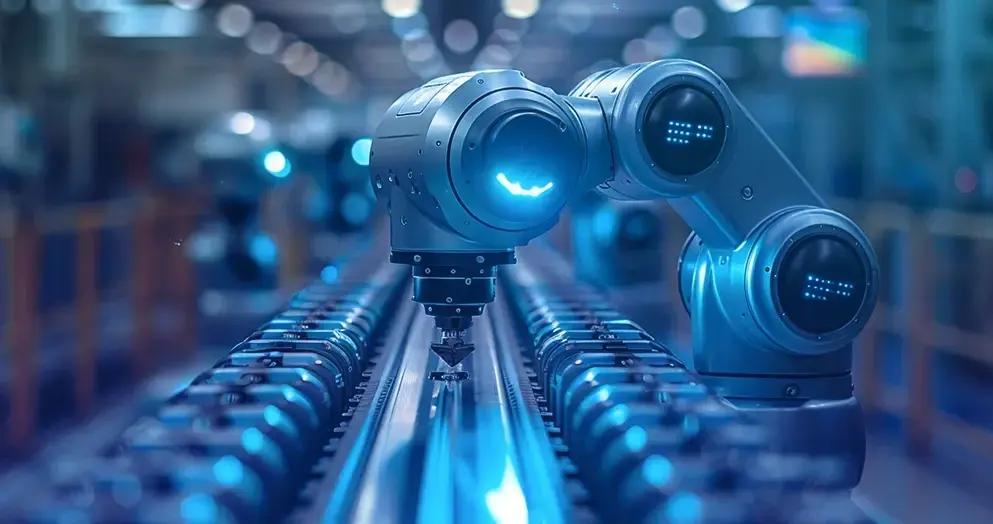Table of contents
In our latest article, we explore how Generative AI is being used to improve supply chain optimisation. We also explore the key challenges businesses face, from complex demand forecasting to real-time disruptions and how AI-driven solutions help overcome them. By leveraging predictive analytics, scenario modelling and supplier assessment, companies can enhance efficiency, reduce costs and improve resilience. Continue reading to learn more.
The Current State of Supply Chain Optimisation
Managing supply chains has become more complex than ever. With global trade expanding, product portfolios and customer expectations rising, traditional supply chain strategies struggle to keep pace. The COVID-19 pandemic exposed the vulnerabilities in supply chains which made agility and resilience top priorities for businesses.
The good news is that AI-driven solutions for supply chains are accessible to help companies achieve top-tier performance in supply-chain management. These solutions can analyse massive datasets to improve demand forecasting and decision-making across procurement, logistics and sales. According to McKinsey, companies using AI for supply chain optimisation have seen logistics costs drop by 15%, inventory levels decrease by 35% and service levels improve by 65% compared to competitors relying on traditional methods.
Challenge of Managing Complexity in Modern Supply Chains
Expanding supply chain or business-planning teams alone is no longer enough to drive better performance. Companies must overcome several critical challenges to build resilient and efficient supply chains:
-
Complex Demand Forecasting: Businesses operate across diverse product categories and geographies, making demand forecasting highly complex. Traditional models often fail to capture dynamic shifts in consumer behaviour, supply constraints and market fluctuations.
-
Managing Interdependent Variables: Supply chains involve hundreds or thousands of interdependent variables, including production capacity, inventory levels, transportation logistics and supplier constraints. Identifying optimal trade-offs between cost, speed and risk requires real-time analysis of vast amounts of data.
-
AI Integration Challenges: AI-driven solutions like predictive maintenance, processing optimisation, and master data quality enhancement are becoming essential in managing supply chain operations. However, integrating these technologies into existing workflows while ensuring scalability remains a significant challenge.
-
Adapting to Real-Time Disruptions: Unforeseen events such as demand surges, production halts, and transportation bottlenecks can disrupt supply chains, leading to financial losses and customer dissatisfaction. Companies must ensure that plans are not only executed efficiently but also dynamically adjusted to respond to unexpected changes in real-time.
Benefits of Using Generative AI for Supply Chain Optimisation
Check out the benefits of using Generative AI for supply chain optimisation:
Resilient Supply Chains
Enhancing supply chain resilience enables organisations to respond quickly to changing market dynamics and capitalise on emerging opportunities. Generative AI facilitates real-time analysis, allowing companies to anticipate disruptions, assess risks, and implement strategic adjustments before significant issues arise.
For example, AI-powered predictive analytics can forecast supply chain bottlenecks due to geopolitical events, extreme weather, or supplier failures. With this foresight, companies can diversify sourcing, re-route shipments, and adjust production schedules to maintain continuity.
Enhanced Performance
Generative AI improves operational efficiency by prioritising alerts that require human intervention and filtering out non-critical disruptions. This helps organisations focus on significant supply chain risks while reducing false alarms.
By distinguishing between temporary fluctuations and serious disruptions, AI ensures that resources are allocated efficiently. This streamlines operation, enhances supply chain visibility, and allows teams to take action where it truly matters.
Optimising Efficiency
Generative AI enables data-driven decision-making across the entire supply chain. Organisations can:
- Optimise supplier selection by evaluating cost, reliability and risk factors.
- Enhance warehouse management by predicting demand fluctuations and ensuring the right inventory levels.
- Reduce costs by dynamically adjusting logistics and fulfilment strategies.
How Generative AI Can Help in Supply Chain Optimisation
Here’s how generative AI solutions can help in your supply chain optimisation:
Supply Chain Intelligence
Generative AI serves as a powerful tool for identifying and simulating potential disruptions in supply chains. By analysing data on port congestion, shipment routes, and supplier dependencies, AI can predict risks and assess their potential impact on operations. It goes beyond just identifying problems, it also recommends proactive mitigation strategies. With AI-driven insights, supply chain managers can develop contingency plans, address vulnerabilities before they escalate and enhance overall resilience.
Scenario Analysis and Optimisation
What if supply chain managers could test different strategies before making real-world decisions? Generative AI enables just that by running “what-if” scenarios within digital twin environments, virtual models that replicate real-world supply chains. AI can simulate the effects of demand fluctuations, production capacity adjustments, inventory changes or supplier reliability issues. This allows decision-makers to evaluate risks, refine their strategies and make data-driven adjustments to optimise efficiency and reduce disruptions.
Supply Chain Planning
Managing supply chains requires analysing vast amounts of data, which can be overwhelming for even experienced professionals. Generative AI simplifies this process by allowing users to interact with advanced planning tools using natural language. Supply chain professionals can ask AI-powered systems questions about inventory levels, supply assurance, order management, and global logistics. This intuitive approach makes complex data more accessible, enabling even less experienced team members to make informed decisions efficiently.
Supplier Assessment
Selecting and managing suppliers is a crucial aspect of supply chain success. Generative AI enhances supplier evaluation by analysing financial reports, performance metrics, customer feedback and other key data points. It then generates insights into supplier performance, potential risks, and opportunities for collaboration. With AI-driven predictions, supply chain teams can negotiate better terms, select reliable partners, and build stronger, data-backed supplier relationships.
Conclusion
Generative AI enables businesses to anticipate disruptions, optimise logistics and improve supplier management through real-time insights and predictive analytics. With AI-driven scenario analysis and automation, companies can reduce costs, mitigate risks and adapt to market fluctuations with greater agility. As supply chains grow more complex, integrating generative AI is no longer optional, it’s now imperative to build long-term success in this industry.
Unsure which Generative AI solutions best fit your supply chain needs? NexGen Labs, the consultancy and R&D division of NexGen Cloud offers expert Generative AI Strategy Consulting to guide you through every stage of your AI journey. From deployment to process optimisation, our team delivers cutting-edge research and personalised strategies to enhance supply chain performance.
Book a consultation with NexGen Labs today and optimise your supply chain with Generative AI-driven solutions.
Explore Related Resources
FAQs
How can Generative AI improve supply chain efficiency?
Generative AI analyses large datasets to optimise demand forecasting, inventory management, and logistics, reducing costs and improving decision-making.
Can AI help mitigate supply chain disruptions?
Yes, AI-powered predictive analytics can anticipate risks like supplier failures or transportation bottlenecks, allowing businesses to take proactive measures.
What role does Generative AI play in supplier assessment?
AI evaluates supplier performance using financial data, customer feedback, and operational metrics, helping businesses choose reliable partners and negotiate better terms.
How does Generative AI enhance scenario planning?
AI simulates “what-if” scenarios in digital twin environments, enabling businesses to assess potential risks and refine strategies before implementing changes.
Is Generative AI difficult to integrate into existing supply chain systems?
While AI integration requires planning, modern solutions offer scalable and adaptable tools that work seamlessly with existing workflows.
How can businesses get started with AI-driven supply chain optimisation?
Companies can begin by consulting AI strategy experts like NexGen Labs to assess their needs and implement tailored AI-driven solutions.


